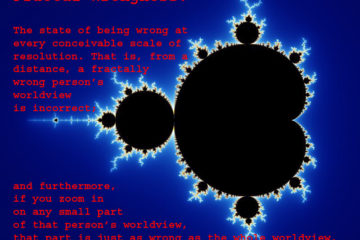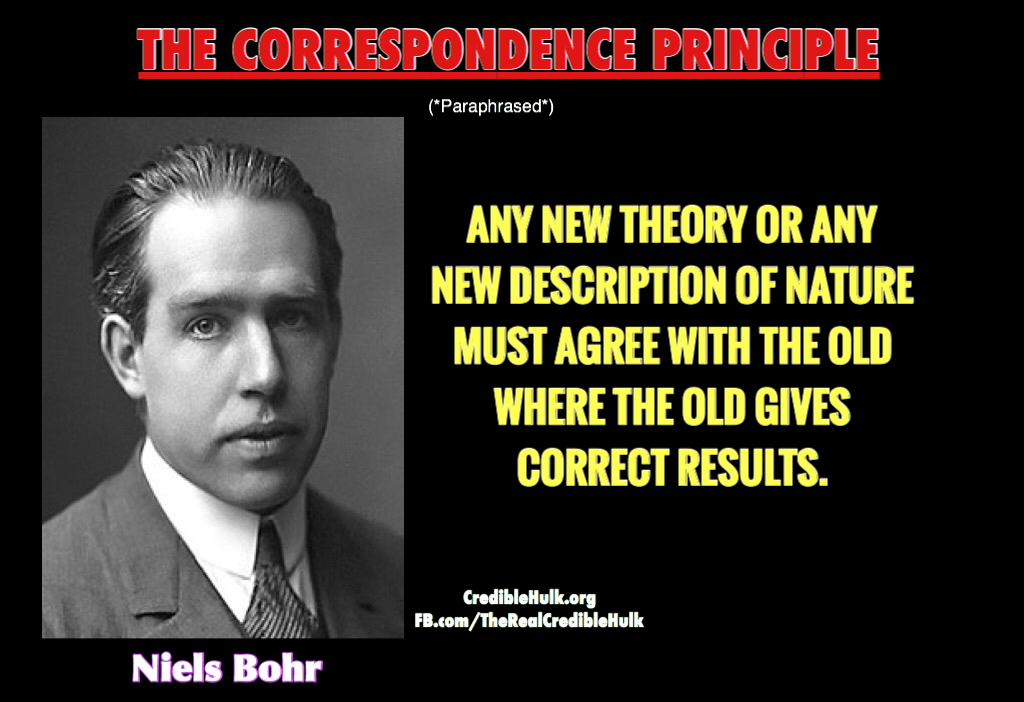Some of the historical instances which typically get characterized as “science having been wrong” can be better understood as incomplete theories/models being conceptually re-framed in order to account for both the facts explained by the prior theory/model, as well as whatever (more recently acquired facts) made the modification necessary. In such cases, the “meaning” of the known facts gets viewed through a new and better lens. When it’s done successfully, the new conceptual framework also makes additional predictions that, if accurate, can expand human knowledge beyond merely summarizing the phenomena already known at the time of its inception.
One of my favorite historical examples of this is the transition from Newton’s Universal Gravitation to Einstein’s General Theory of relativity. The fact that apples can be readily observed moving from tree branches to the ground wasn’t overturned by General Relativity because Newton wasn’t wrong about that. It was a fact long before Newton, and remains a fact today. What changed was the way in which such occurrences were conceptualized and explained.
Newton didn’t have a comprehensive theory, but he had an equation, m*d2r/dt2 = G*M*m/r^2, which seemed to imply non-local action at a distance. General Relativity on the other hand, which involved considerably busier mathematics (involving tensors and differential geometry), conceived of the falling apple as moving naturally along a geodesic path on a 4 dimensional spacetime manifold which had been curved by the presence of a large mass (Earth in this case). It also made other predictions that people may never have thought of otherwise and which expanded our knowledge (i.e. gravitational lensing for example)., the he point being that it didn’t so much refute the basic facts so much as it explained them in a new way and explained other facts that the Newtonian model didn’t account for.
Similarly, we know that General Relativity cannot be the end of the story because it produces absurd results at the outer limits of its predictive power (such as the prediction of actual singularities), and it doesn’t play well with another extremely well-tested theory, quantum mechanics (and quantum field theory). We do know that any candidate for replacing it will have to (at minimum) account for the facts that the current theories do predict and account for, or else it would be a downgrade rather than an improvement.
This type of reiterative evolutionary process represents the scientific process at its best, and recognizing that can go a long way in distinguishing between varying degrees of relative truths (as described in Asimov’s famous “the relativity of wrong” essay), and assigning fair and reasonable degrees of confidence to various aspects of our current scientific understanding of a given subject.
Asimov famously summarized it thusly:
“John, when people thought the earth was flat, they were wrong. When people thought the earth was spherical, they were wrong. But if you think that thinking the earth is spherical is just as wrong as thinking the earth is flat, then your view is wronger than both of them put together.”
Although improving public awareness of this may not be sufficient in and of itself to ameliorate the problem of public science denial, since such attitudes are often fueled by ulterior motivations rather than by lack of knowledge alone, it is nevertheless important insofar as understanding the way in which cumulative knowledge progresses in science, because understanding that makes it clear why nihilistic dismissal of science on the grounds that it can be wrong is an untenable and irrational position.
Yet, we see those sorts of rationalizations constantly by people who reject evolution, climate science, vaccine science, science-based medicine and the science of genetically engineered foods.
So to summarize, the take away message here is twofold:
1) The phenomenon of science correcting mistakes is one of its strengths: not one of its weaknesses.
and
2) Just because newer theories or models incorporate and explain additional facts and information doesn’t mean that the facts explained by the old theories and models aren’t true, or that the new ones don’t have to account for them. Often times the improved theory or model is inclusive of the old one, but merely explains the facts in a different way and/or accounts for additional information that the old one didn’t cover. – Credible Hulk 



4 Comments
David N. Andrews M. Ed., C. P. S. E. · August 10, 2015 at 12:12 pm
Basically … yes. Absolutely agreed.
Jim · October 30, 2015 at 8:08 am
Good article. Post grad. B. App. Sc.
Robert Lee · October 28, 2015 at 1:27 pm
I wish I had this article (or eloquence) when having a discussion with a very religious person who used quotations around the word dinosaurs in order to imply they never really existed, because “science has been wrong before.”
Why Country of Origin Labeling is not an argument for mandatory GMO labeling: – The Credible Hulk · May 15, 2016 at 1:08 am
[…] was a scientific consensus that smoking was safe” canards, which I’ve rebutted here and here respectively. However, the sincerity of the labeling proponent is not a prerequisite to […]
Comments are closed.